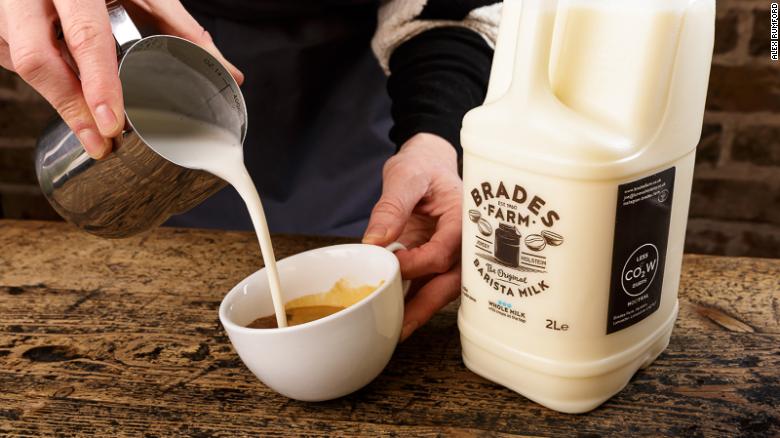Figueres: Reaching 2050 with "net zero" emissions 2:23
London (CNN Business) -
With more than 1.4 billion cows in the world, livestock is responsible for almost 10% of all greenhouse gases generated by human activity, a large part coming from methane in digestive gases that cows emit, but a new feed supplement could reduce those emissions by 30% on average, according to its creators.
If all the cows in the world consumed this supplement, the reduction in emissions could be equivalent to removing more than 300 million cars from the roads of Europe.
The supplement, developed by the Swiss-British company Mootral, based on extracts of garlic and citrus fruits, is mixed with the usual feed of cattle and reduces methane emissions by the equivalent of one ton of carbon dioxide per cow per year.
The supplement comes in the form of granules that are mixed with the cows' feed twice a day.
The company converts these savings into carbon credits, approved by Verra, a global voluntary carbon offset program, which are sold to companies that want to offset their emissions.
The proceeds from the sale of carbon credits are returned to ranchers, subsidizing the initial cost of livestock feed and encouraging them to buy more, Mootral CEO Thomas Hafner tells CNN Business.
Virtual Climate Summit: Biden Announces US Aims To Cut Carbon Emissions By Up To 52% By 2030
"Carbon credits are an important stimulus tool to drive the adoption of climate-friendly technologies," says Hafner.
Agricultural market
Brades Farm, in Lancashire, in the North West of England, is the first commercial farm to adopt Mootral's carbon credit program.
His herd of 440 dairy cows receives the supplement twice a day.
Feed additives help prevent microbes in the cow's stomach from producing methane, which is often produced as a by-product of digesting fibrous plant material such as grass.
Brades Farm presents itself as a climate-friendly company, with the slogan "less cow gas" on its boxes.
"It's hard to make a living from livestock, there are always bills to pay," says Joe Towers, who runs the farm with his brother Ed. "Carbon credits are a real opportunity [...] to offset that expense for ranchers," he says. .
The food supplement has an extra commercial benefit for the farm.
By marketing their cows as low methane, the brothers have found a niche selling premium milk to London coffee shops.
Mootral's so-called "CowCredits" aren't cheap.
They entered the market in April at a cost of about US $ 80 each, and each credit offsets a ton of CO2.
Forest offset systems, by comparison, cost on average $ 4 per ton of CO2, according to research company Ecosystem Marketplace.
But Hafner believes that there is demand for credits that offer a "immediate and verified reduction" in emissions, rather than those that promise future savings that may not occur.
Brands label products showing climate impact 0:53
With growing pressure from companies to reduce their climate impact, the demand for offsets is growing.
Ecosystem Marketplace estimates that the global voluntary offsets market was worth $ 320 million in 2019, more than double its value two years earlier.
The Taskforce on Scaling Voluntary Carbon Markets, a private sector initiative, estimates that it could grow to more than $ 50 billion by 2030.
So far, Mootral has generated over 300 CowCredits.
It wants to create 10,000 in the next year, and is trying to get an investment of US $ 2.5 million to expand its operations.
Scale up
But there are challenges.
The amount of methane reduced by the feed supplement depends on the breed and environment of the cow.
So far, Mootral has only done extensive testing on the two breeds from Brades' farm, but Hafner says he plans to do more studies in different parts of the world.
The different feeding routines of cattle and dairy cows pose another challenge.
Dairy cows usually come home every day to be milked, so it is easier to put them on a strict diet.
Still, Hafner is confident that Mootral will find a solution, and the company will soon begin testing on a Texas ranch with 12,000 cattle.
Liam Sinclair, Professor of Animal Sciences at Harper Adams University in the United Kingdom, says that it will be necessary to monitor the effects of the Mootral product over time, as there is a risk that the change in diet will affect digestion of the cow, which could reduce its growth rate or milk production.
"It is also very important that the product is available and profitable in developing countries so that there is a significant reduction in methane production," he adds.
greenhouse gas emissions Livestock

